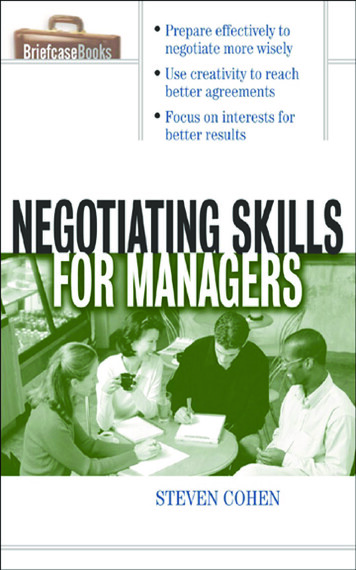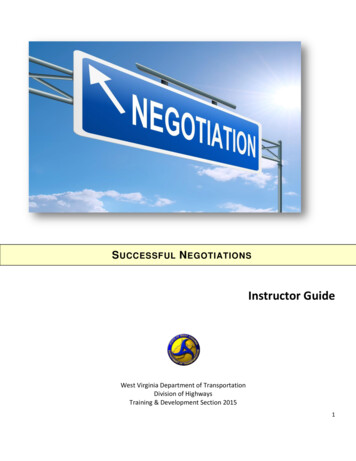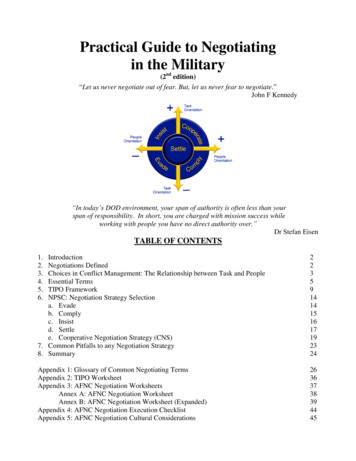
Transcription
CohenFM.qxd2/11/029:25 AMPage 1NegotiatingSkills forManagers
CohenFM.qxd2/11/029:25 AMPage 2Other titles in the Briefcase Books series include:Customer Relationship Managementby Kristin Anderson and Carol KerrCommunicating Effectively by Lani ArredondoPerformance Management by Robert BacalRecognizing and Rewarding Employees by R. Brayton BowenSix Sigma for Managers by Greg BrueMotivating Employees by Anne Bruce and James S. PepitoneLeadership Skills for Managers by Marlene CaroselliEffective Coaching by Marshall J. CookConflict Resolution by Daniel DanaProject Management by Gary R. HeerkensManaging Teams by Lawrence HolppHiring Great People by Kevin C. Klinvex,Matthew S. O’Connell, and Christopher P. KlinvexEmpowering Employees by Kenneth L. Murrell and MimiMeredithManaging Multiple Projects by Michael Tobis and Irene P. TobisPresentation Skills for Managers, by Jennifer Rotondoand Mike RotondoThe Manager’s Guide to Business Writingby Suzanne D. SparksSkills for New Managers by Morey StettnerTo learn more about titles in the Briefcase Books series go towww.briefcasebooks.comYou’ll find the tables of contents, downloadable sample chapters, information on the authors, discussion guides for usingthese books in training programs, and more.
CohenFM.qxd2/11/029:25 AMPage 3A efcaseiBr oB okNegotiatingSkills forManagersSteven P. CohenMcGraw-HillNew York Chicago San Francisco Lisbon LondonMadrid Mexico City Milan New Delhi San JuanSeoul Singapore Sydney Toronto
ebook copyright 5x8.qxd9/18/024:37 PMPage 1Copyright 2002 by The McGraw-Hill Companies, Inc. All rights reserved. Manufactured in the UnitedStates of America. Except as permitted under the United States Copyright Act of 1976, no part of thispublication may be reproduced or distributed in any form or by any means, or stored in a database orretrieval system, without the prior written permission of the publisher.0-07-141545-9The material in this eBook also appears in the print version of this title: 0-07-138757-9.All trademarks are trademarks of their respective owners. Rather than put a trademark symbol afterevery occurrence of a trademarked name, we use names in an editorial fashion only, and to the benefitof the trademark owner, with no intention of infringement of the trademark. Where such designationsappear in this book, they have been printed with initial caps.McGraw-Hill eBooks are available at special quantity discounts to use as premiums and sales promotions, or for use in corporate training programs. For more information, please contact George Hoare,Special Sales, at george hoare@mcgraw-hill.com or (212) 904-4069.TERMS OF USEThis is a copyrighted work and The McGraw-Hill Companies, Inc. (“McGraw-Hill”) and its licensorsreserve all rights in and to the work. Use of this work is subject to these terms. Except as permittedunder the Copyright Act of 1976 and the right to store and retrieve one copy of the work, you may notdecompile, disassemble, reverse engineer, reproduce, modify, create derivative works based upon,transmit, distribute, disseminate, sell, publish or sublicense the work or any part of it without McGrawHill’s prior consent. You may use the work for your own noncommercial and personal use; any otheruse of the work is strictly prohibited. Your right to use the work may be terminated if you fail to comply with these terms.THE WORK IS PROVIDED “AS IS”. McGRAW-HILL AND ITS LICENSORS MAKE NO GUARANTEES OR WARRANTIES AS TO THE ACCURACY, ADEQUACY OR COMPLETENESS OFOR RESULTS TO BE OBTAINED FROM USING THE WORK, INCLUDING ANY INFORMATION THAT CAN BE ACCESSED THROUGH THE WORK VIA HYPERLINK OR OTHERWISE,AND EXPRESSLY DISCLAIM ANY WARRANTY, EXPRESS OR IMPLIED, INCLUDING BUTNOT LIMITED TO IMPLIED WARRANTIES OF MERCHANTABILITY OR FITNESS FOR APARTICULAR PURPOSE. McGraw-Hill and its licensors do not warrant or guarantee that the functions contained in the work will meet your requirements or that its operation will be uninterrupted orerror free. Neither McGraw-Hill nor its licensors shall be liable to you or anyone else for any inaccuracy, error or omission, regardless of cause, in the work or for any damages resulting therefrom.McGraw-Hill has no responsibility for the content of any information accessed through the work.Under no circumstances shall McGraw-Hill and/or its licensors be liable for any indirect, incidental,special, punitive, consequential or similar damages that result from the use of or inability to use thework, even if any of them has been advised of the possibility of such damages. This limitation of liability shall apply to any claim or cause whatsoever whether such claim or cause arises in contract, tortor otherwise.DOI: 10.1036/0071387579
DOI Page 5.5x8.359/18/021:54 PMPage 1 Want to learn more?We hope you enjoy thisMcGraw-Hill eBook! Ifyou’d like more information about this book,its author, or related books and websites,please click here.
CohenFM.qxd2/11/029:25 AMPage vFormeinfatbuhsk,cl.For more information about this book, click here.ContentsPreface1. Competitive Versus Collaborative Decision MakingWhat Is Negotiation?What Negotiation Is NotTypes of NegotiationInvestigating Your InterestsWhat Differences Does It Make to DistinguishBetween Interests and Positions?How Do You Deal with Positional Bargainers?Is Money Really the Interest?Primary (Fundamental) and Secondary(Derivative) InterestsLooking Beyond Our Personal InterestsThe Three C’s of InterestsWhen Interests ConflictManager’s Checklist for Chapter 1xi124578101213151719202. BATNA—Choosing Whether to Walk Away23Making ChoicesBalance of PowerUnderstanding Our BATNA Offers ChoicesWhat Is Our Walking-in BATNA?Does BATNA Ever Change?BATNA Is Not the Bottom LineElements of BATNAsStrengthening and Weakening BATNAsAssumptionsManager’s Checklist for Chapter 223242527272930353637vCopyright 2002 by The McGraw-Hill Companies, Inc. Click Here for Terms of Use.
CohenFM.qxd2/11/029:25 AMviPage viContents3. Are We Ready? Inoculation Protects the PartiesSubstantive Inoculation: Knowing the SubjectIn Negotiation, the Past Has No FutureSelling the Product to the SalespersonGoals of InoculationInoculation as a Tool for Improving Your BATNAWhat Information Do We Need About Ourselves?What Information Do We Need About Other Parties?Preparing for Negotiation on Your OwnActive ListeningInoculation Includes Process as Well as SubstanceInternal and External InoculationThe Bottom LineWhen Inoculation Is ImpossibleManager’s Checklist for Chapter 34. Preparation Part One: Stakeholders,Constituents, and InterestsShooting from the HipUnplanned NegotiationsSurprisesWhat Does Preparation Mean?Looking Inside YourselfUnderstanding the Subject MatterInternal NegotiationPreparing Other PartiesJuggling Conflicting AgendasStrengthening and Weakening BATNAsReasons to Prepare for NegotiationManager’s Checklist for Chapter 45. Preparation Part Two: Developing a StrategyUsing Interest MappingMaking AssumptionsInterested PartiesStakeholdersCreate Your Interest MapRecord Your Assumptions About Stakeholders’ InterestsDon’t Go It AloneLow-Cost SolutionsHow to Use Interest MapsUsing Your Interest Map in 9606162636566676870707172727375767879
CohenFM.qxd2/11/029:25 AMPage viiContentsBe Prepared for Hot ButtonsDonut Hole Interest MapsAfter the NegotiationBe Prepared!Manager’s Checklist for Chapter 56. Communication: Key to Effective NegotiatingPreparation Put to UseCommunicating to InfluenceActive ListeningCommunicating with Difficult PeopleReframingWhat Is Your Point?Communicating InformationManager’s Checklist for Chapter 67. Emotions: Dealing with Ourselves and OthersDo Emotions Belong in Negotiation?Recognizing and Prioritizing EmotionsSurpriseAre You Negotiating to Solve a Problemor Have a Fight?Confidence-Building MeasuresOnly One Person Can Get Angry at a TimeReacting to Emotional OutburstsDe-escalationHealing RelationshipsDealing with Difficult PeopleBulliesExpressing Emotions Is Not Bad NegotiatingManager’s Checklist for Chapter 78. Dealing with Annoyance and Levelingthe Playing FieldMythsPsychological GamesGiving or Taking OffenseControlling the BoardPhysical Set-UpBuilding Confidence in Your CounterpartI Understand You, But That Doesn’t MeanI Agree with 102103104105105106106108108113114115116116118
CohenFM.qxd2/11/029:25 AMviiiPage viiiContentsExpectationsEarly Wins Can Be Traded Away LaterLevel Playing FieldManager’s Checklist for Chapter 89. Globalism Starts at Home: Cross-Cultural IssuesNationality Is Not the Only DifferenceInternal NegotiationBringing Tribes TogetherYou Can’t Tell a Book by Its CoverNegotiation ChoreographyWhen Yes Means NoOffense as a Cultural BarrierOvercoming Cultural ObstaclesCan I Depend on Them?Don’t Get Hung Up on StyleManager’s Checklist for Chapter 910. Creativity and Bargaining ChipsSingle-Issue NegotiatingMulti-Issue NegotiationsThe Value Creation CurveValue Versus PriceDon’t Dictate ValueSeparating People from the ProblemHealing RelationshipsCheck the Appeal of Creative Elements—One by OneDon’t Hog the CreditConfirming Mutual UnderstandingOpen Your Mind and Expand the PossibilitiesManager’s Checklist for Chapter 1011. The Negotiation ProcessAgenda SettingBuilding Confidence and ComfortUtilizing Your Interest MapBargainingBuilding Long-Term CommitmentObjective CriteriaZOPAExpectations and 5165
CohenFM.qxd2/11/029:25 AMPage ixContentsMultitaskingIt’s Not Over Until It’s OverNot Rocket ScienceManager’s Checklist for Chapter 1112. The Seven Pillars of Negotiational WisdomPaying Attention to nessCommitmentCommunicationFoundation of the Seven PillarsManager’s Checklist for Chapter 5186189
This page intentionally left blank.
CohenFM.qxd2/11/029:25 AMPage xiPrefaceWhen I told my father of my plans to develop a firm specializing in training people how to negotiate, he was quite surprised. When I indicated that many people feel the need tobecome more confident, he was dumbfounded. “Don’t peopleknow negotiating is fun?” he asked. But he’s good at it and likesto make deals. The aim of this book is to help you get good at itas well and to increase your confidence and the resultingrewards that can come from concluding an effective negotiation.The title of this book is Negotiating Skills for Managers, buta more descriptive title would include the subtitle “andEveryone Else.” Negotiation is a universal human activity—weall engage in bargaining at one level or another on a pretty regular basis. And while we all need good negotiation skills in business, these skills are valuable in our personal lives as well.Several years ago, in a response to a follow-up form askingfor a long-term evaluation of our flagship negotiation course, aparticipant responded that he had not used negotiation in hisprofessional life—but he had used it to save his marriage. I hopethis book will enhance your professional skills as a negotiator;and then you can view any personal impact simply as an additional benefit.Plan of the BookNegotiating Skills For Managers has 12 chapters. In the first 10we discuss negotiation paradigms, philosophical underpinnings,and specific tools and techniques. You’ll find a detailed review ofthe idea of “interests” and BATNA (Best Alternative To aNegotiated Agreement)—two things all negotiators need toxiCopyright 2002 by The McGraw-Hill Companies, Inc. Click Here for Terms of Use.
CohenFM.qxd2/11/02xii9:25 AMPage xiiPrefaceunderstand. There’s also a discussion of the Interest Map , acrucial preparation tool introduced in Chapter 5 and used insubsequent chapters. The two final chapters bring it all together,with Chapter 11 focusing on the negotiation process andChapter 12 summarizing what I call the Seven Pillars OfNegotiational Wisdom .You’ll find that Negotiating Skills for Managers does not promulgate a series of hard-and-fast rights and wrongs. Effectivenegotiators know that each negotiation has unique characteristics and being flexible can make the difference between effectiveness and wasted time. This book emphasizes that youshould not view negotiation as a competitive exercise, and thatthe best way to conduct a successful negotiation is for all parties to be satisfied when you conclude the agreement.Special FeaturesThe idea behind the books in the Briefcase Books series is togive you practical information written in a friendly person-toperson style. The chapters are short, deal with tactical issues,and include lots of examples. They also feature numerousboxed sidebars designed to give you different types of specificinformation. Here’s a description of these sidebars and howthey’re used in this book.These boxes are designed to give you tips and tacticsthat will help you more effectively implement themethods described in this book.These boxes provide warnings for where things couldgo wrong when you’re trying to prepare for and undertake a negotiation.These boxes highlight insider tips for taking advantageof the practices you’ll learn about in this book.
CohenFM.qxd2/11/029:25 AMPage xiiiPrefacexiiiEvery subject has its special jargon and terms.Theseboxes provide definitions of these concepts.It’s always important to have examples of what othershave done, either well or not so well. Find such storiesin these boxes.This identifies boxes where you’ll find specific procedures you can follow to take advantage of the book’sadvice.How can you make sure you won’t make a mistakewhen negotiating? You can’t, but these boxes will giveyou practical advice on how to minimize the possibility.AcknowledgmentsWhile any mistakes in Negotiating Skills for Managers are myresponsibility, I have been lucky enough to have received helpand support from my wife, Andréa F. F. MacLeod, and my colleague Marsha M. Vaughan. John Woods, of CWL PublishingEnterprises, made the whole project possible, from his innovative formatting of the Briefcase Books series to his pointed editorial comments—and his effective prodding. Joan Patersonserved as editor and had a lot to do with finalizing the manuscript that has become this book. In addition, Nancy Woods andBob Magnan, also of CWL, had a hand in creating the finalproduct you have before you.This book also owes a considerable debt to ideas from colleagues within The Negotiation Skills Company, Inc.: AnthonyAdamopoulos, Esq., Mary Ellen Shea, Ron Scruggs, DeniseDelaney, Curtis Johnson, and Paul Cohen, Esq. Of the manyothers who have contributed to my understanding, MarshallDerby, Felicity Barber, Ricardo Altimera-Vega, and the late
CohenFM.qxd2/11/029:25 AMxivPage xivPrefaceAnthony Hyde stand out. My daughters Julia and Abigail havekept me on my negotiating toes all their life.Fundamentally, however, my most significant negotiationlearning took place at the knee of my father, Martin E. Cohen. Iowe it all to him.For further information and advice about negotiation, youare invited to visit the Web site of The Negotiation SkillsCompany, Inc.: www.negotiationskills.com.
CohenFM.qxd2/11/029:25 AMPage xvAbout the AuthorxvAbout the AuthorSteven P. Cohen is the founder and head of The NegotiationSkills Company, Inc., a consulting and training organization thathas presented negotiation skills training to people from morethan 40 countries. His clients come from business sectors asdiverse as healthcare and the manufacture of nuclear weapons.The Negotiation Skills Company’s mission statement is simple:to advance the cause of civility in negotiation to the benefit ofall participants.The breadth of Steve Cohen’s experience, negotiating in thepublic and private sectors and working with people from all overthe world, has given him a unique perspective on the do’s anddon’ts of negotiation. In Negotiating Skills for Managers, Steveoffers his negotiation experience, communication skills, andteaching techniques to a broader audience.His company’s award-winning Web site, www.negotiationskills.com, has subscribers from over 70 countries, on everycontinent except Antarctica. You can contact Steve attnsc@negotiationskills.com.Copyright 2002 by The McGraw-Hill Companies, Inc. Click Here for Terms of Use.
This page intentionally left blank.
CohenFM.qxd2/11/029:25 AMPage xviiNegotiatingSkills forManagers
This page intentionally left blank.
Cohen01a.qxd1/11/0210:06 AMPage 11Competitive VersusCollaborativeDecision MakingNegotiating is not a competitive sport.Paul Murphy is on an extended business trip and getting prettysick of staying in hotel rooms that all look alike even thoughthey’re in different cities. His company has a relationship withthe hotel chain where he’s been staying, but the business deal isfor the least expensive room. How can he improve the accommodations when he checks into the next hotel?Sally Marks manages a team in the design department of anautomobile manufacturing company. A directive has arrivedfrom the marketing department indicating the top priority forthe next design cycle is to develop a vehicle that weighs nomore than a ton, has space for five passengers, can cruise at 75miles per hour for extended periods, complies with increasinglystrict exhaust emission standards, and can fit into small urbanparking spaces. The marketing department also wants manufacturing costs held substantially below any previous cars hergroup has designed—yet use high-tech materials.1Copyright 2002 by The McGraw-Hill Companies, Inc. Click Here for Terms of Use.
Cohen01a.qxd1/11/02210:06 AMPage 2Negotiating Skills for ManagersSally and her team’s delivery on this combination of specifications will require the cooperation of members of teams frommanufacturing, purchasing, and testing segments of the company. In addition, Sally has to cope with regulatory issues as wellas external suppliers in order to accomplish her task.When Fred and Jane Yancey and their two kids moved into theirnew home, it needed a lot of fixing up as well as an addition.Some of their neighbors have been very friendly—as well asunderstanding about the noise of construction machinery—butothers have complained to the local building inspectors withouttalking first to Fred or Jane. The Yanceys are the first AfricanAmerican family to move into the neighborhood. They wonderwhether the complaints to the building inspector relate to theconstruction itself or whether other factors are involved.As chief of her firm’s team selling processors to a public sectorutility company in China, Angela MacKenzie has to contendwith competitors from the U.S. and other countries. But she iseven more challenged by the process of figuring out how muchprogress she and her colleagues are making convincing the representatives of the Chinese utility company of the value of theprocessors they are selling.Every day, all over the world, people find themselves in similar situations. They want to accomplish a particular task, clarifya relationship, or simply find resources to achieve more thanthey might by making a deal with someone else. They need tonegotiate to get from their starting point to their objective.Negotiating Skills for Managers is designed to help its readers understand and utilize a process that is fundamental to business—and the rest of life.What Is Negotiation?When people want to do something together—buy or sell anitem, make a business deal, decide where to go for dinner—they need to use some sort of mechanism for reaching an
Cohen01a.qxd1/11/0210:06 AMPage 3Competitive Versus Collaborative Decision Making3Waging PeaceIn the old days, when wealthy landowners had a dispute theywould hire mercenaries—knights—to wage war to determine who was right.The winner of the battle was acclaimed the winnerof the dispute.Then somebody invented lawyers. For the past thousandyears or so, we’ve been waging law to decide who wins.Today, as people rely increasingly on negotiation to resolve disputes or reach agreements, they are waging peace to reach the resolution that is mostacceptable to all parties.agreement. Unless they agree instantly on every element of thechoices to be made, they need to use a mutually acceptableprocess for decision making. Negotiation is one name for a variety of joint decision-making processes, although people alsouse such terms as making a deal, trading, bargaining, dickering,or (in the case of price negotiation) haggling.A successful negotiation has taken place when the partiesend up mutually committed to fulfilling the agreement they havereached. Fairness is a crucial element to make a negotiationprocess succeed. Some people negotiate as if their most significant objective is to take advantage of other parties; this is selfdefeating. If any party feels unfairly treated, he or she may walkaway from the negotiation with a negative feeling and a disinclination to live up to the agreement.One way to think of negotiation is to compare knitting and weaving. WhenNegotiation The processyou knit something, youof two or more partiesgenerally use a singleworking together to arrivestrand of yarn. Andat a mutually acceptable resolution ofalthough knitted fabricsone or more issues, such as a commay contain a variety ofmercial transaction, a contract, or acolors and textures, youdeal of any sort.Negotiation is a give-and-take barcan easily stretch them outgaining process that, when conductedof shape. In weaving, thefabric is created by using at well, leaves all parties feeling goodabout the result and committed toleast two strands comingachieving it.from different directions.
Cohen01a.qxd1/11/02410:06 AMPage 4Negotiating Skills for ManagersWoven fabrics tend to have greater tensile strength and durabilitythan knitted fabrics. Negotiation is more like weaving—theprocess takes contributions from various parties. While weavingand knitting may involve a single person’s skills, negotiationcalls for contributions from two or more parties. By drawingupon the knowledge, skills, and other input of the multiple parties, a good negotiation process weaves together a durableagreement whose strength derives from the fact that the partiesreached agreement by working together.What Negotiation Is NotWhen your boss gives you an order and your only choice is todo what he or she says, that is not negotiation. If an outsider isbrought in to make a decision between parties using arbitration,the parties are legally bound to follow the arbitrator’s decision.That is not negotiation. When parties are not working togetherto reach an agreement, negotiation does not take place.It’s important to keep in mind that negotiation is not a competitive sport. This doesn’t mean, however, that we’re never in acontest with other parties. But we are not competing with theaim of making sure we crush the opposition. Rather, we areaiming to do the best we can for ourselves. Using this philosophy, we are less interested in the sporting aim of competing andmore interested in looking out for ourselves. In negotiation, youwant to do well for yourself, but not because you want to beatsomeone else. Effective negotiation is held in its proper contextas a mechanism for pursuing interests.Your dealings with customers—or suppliers, neighbors, or relatives—should not be viewed as competitions. We negotiate withpeople to reach an agreement that meets as many of the parties’interests as possible. Our fundamental obligation is to pursue ourown interests, assuming that the other parties are doing theirbest to get their interests met. We need to remember, however,that if the negotiating parties aren’t satisfied with the process aswell as with the result, odds are that the promises constituting
Cohen01a.qxd1/11/0210:06 AMPage 5Competitive Versus Collaborative Decision Making5the agreement won’t be fulfilled. Negotiation based on individualinterests requires that we open our minds and our strategizing toother parties’ interests as well as our own. The definition ofnegotiation can now be expanded to describe how parties tradethings of value in a civilized manner.Types of NegotiationPeople usually view negotiation as either confrontational orcooperative. People who view negotiation as a confrontation seethe process as a zero-sum game in which a limited number ofbargaining chips are to be won—and they want to be the winners. The confrontational winner-take-all approach reflects amisunderstanding of what negotiation is all about and is shortsighted. Once a confrontational negotiator wins, the other partyis not likely to want to deal with that person again.Cooperative-approach negotiators see a wide range of interests to be addressed and served. They understand that negotiation is not a zero-sum game but a way to create value for all theparties involved. The cooperative negotiator understands theimportance of all stakeholders winning something—this is howyou build long-term mutually beneficial relationships.The cooperative approach is known as interest-based negotiation. Interest-based negotiation is particularly effective in amarketplace characterized by diversity. We often need to reachagreement with people who are different from us—culturally,ethnically, or economically.If we cannot get beyondInterest-based negotiathe differences, they cantion An approach to negocreate obstacles to agreetiation where the partiesment. To do this, we needfocus on their individual interests andto focus on the interests of the interests of the other parties tofind a common ground for building athe parties instead of onmutually acceptable agreement.the parties’ differences.Those interests can formthe building blocks upon which agreement is based.
Cohen01a.qxd1/11/02610:06 AMPage 6Negotiating Skills for ManagersI’m Good, You’re GoodWhen you brush your teeth in the morning, do you see a“good” or “bad” person in the mirror? Unless there’s something extraordinary about you, you probably see a good person. It isimportant to remember that the other parties with whom you will benegotiating likely see “good” people in their mirrors as well. If all parties undertaking negotiation see themselves as good people, it makessense for them to treat one another with that understanding. If youapproach a deal-making process as an opportunity to crush the opposition, you are choosing to beat up on someone who views himself asa good person.My Way or the HighwaySome people approach negotiation with an attitude that can becharacterized as “my way or the highway.” This occurs in a situation where one person believes that he or she holds all thecards in a negotiation. If you want something from that person,you may have to give him something he really values.Think of your experiences in renting cars. Automobile rentalcompanies have thought of all the answers; they ask you tosign and initial the front of the contract in several places. Theactual contract is on the back of the paper you sign, generallyprinted in very small letters in extremely light ink. If you want arental car, you can’t negotiate the contract. The rental companyhas adopted a position from which they will not budge. There isno clearer example of the “my way or the highway” approach.Position This is the finalanswer to the question“What do you want?” It canbe okay to start with a position in anegotiation, but unless you understand the interests behind your position and are open to alternativeapproaches, you are likely to findyourself stuck in a corner you cannotescape without losing face.Hazards of Adopting aPositionIn negotiations betweenparties who each havesome power to influencethe results (the usual typeof negotiation), the crucialthing to remember is thattaking a position limitsyour capacity to bargain. A
Cohen01a.qxd1/11/0210:06 AMPage 7Competitive Versus Collaborative Decision Making7position is a party’s answer to the question “What do you want?”If you adopt a position from which you will not budge, you runthe risk of losing face if you have to back down from theapproach you are using.Investigating Your InterestsThe more effective route to achieving an acceptable conclusionto a negotiation is to look at the interests of the parties. Yourinterest is the answer to the question, “Why do you want (a particular result)?” A problem arises when you ask the “why” question: Your response may be a justification of a party’s positionrather than an explanation of the interest that needs to be met.If the response to “Why do you want it?” is “Because it is in thecompany’s best interest,”your answer justifies aWorking withposition but does not reallyDeadlinesexplain the interests thatLet’s say you are told that aunderlie it. To move pastjob has to be accomplished by a cerjustification to learn whichtain time. If you think the deadlinethreatens whether the job can beinterests are at the core ofwhy someone wants some- done as well as it should to yield thebest results for your division, youthing, you need to ask:need to go beyond the justification ofHow will that approachthe deadline of the person withaccomplish what you arewhom you’re negotiating and look atlooking for? or If we agreethe interests the deadline is intendedto do that, what goal ofto serve.yours will it satisfy?Understanding Our Own InterestsOne of the most difficult things to do is to understand our owninterests. Since you and I tend to think that we are each agood person, it is easy tofall into the trap of thinking, Positions and interestsOur positions can be“If I want it, it must be thebest answer.” However, you thought of as what we want;our interests reflect what we need.need to ask yourself—and
Cohen01a.qxd1/11/02810:06 AMPage 8Negotiating Skills for Managersthis can be tough—whether the way you want to do something isreally the best approach, or whether taking anothe
The title of this book is Negotiating Skills for Managers, but a more descriptive title would include the subtitle “and Everyone Else.” Negotiation is a universal human activity—we all engage in bargaining at one level or another on a pretty reg-ular basis. And while we a










